|
|
Our Holy Father Isaac II of Syria (St Isaac the Syrian is
commemorated on
Jan 28th).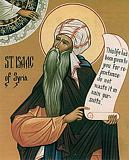 St Gregory the Dialogist writes about this Isaac. He went to Italy in the time of the Goths and went into the church in the town of Spoleto to pray. He asked the verger to leave him locked in the church all night, and thus spent the night in prayer without moving from that place. He spent the next day and night in the same way. The verger called him a hypocrite and struck him a blow - and lost his reason at that same moment. Seeing how the verger was so fiercely tormented, Isaac bent over him and the evil spirit fled from him, leaving him whole. People came to hear of this happening, and the whole town thronged around this wonderful old man. They offered him money and goods, but he refused them all and would accept nothing. Instead, he withdrew to a forest, where he built himself a cell which quickly became transformed into a large monastery. Isaac became famous for his miracles, especially for his discernment. One evening he told the brethren to take all the hoes out to the vineyard and leave them there. The next day, the brethren set out for the vineyard, taking their lunch, as they had no workers. When they got there, they found as many people working as there were hoes to work with. It transpired that these people had come as thieves to steal the hoes, but, by the power of God, they were constrained to work all night.
On another occasion, a couple of almost-naked men came seeking clothing from Isaac. He sent a monk to a hollow tree at the end of the road, to bring what he found there. The monk went off, found some clothing and brought it back to the monastery. The abbot took the clothing and gave it to the beggars. They were profoundly ashamed as they recognised their own clothing, which they had concealed in that tree.
A man once sent two beehives to the monastery. A monk hid one of them on the way, and brought the other to the abbot. The saint said to him: 'Be careful when you go back to that beehive you hid on the way. It's been taken over by poisonous snakes. Take care they don't bite you!' St Gregory the Dialogist writes about this Isaac. He went to Italy in the time of the Goths and went into the church in the town of Spoleto to pray. He asked the verger to leave him locked in the church all night, and thus spent the night in prayer without moving from that place. He spent the next day and night in the same way. The verger called him a hypocrite and struck him a blow - and lost his reason at that same moment. Seeing how the verger was so fiercely tormented, Isaac bent over him and the evil spirit fled from him, leaving him whole. People came to hear of this happening, and the whole town thronged around this wonderful old man. They offered him money and goods, but he refused them all and would accept nothing. Instead, he withdrew to a forest, where he built himself a cell which quickly became transformed into a large monastery. Isaac became famous for his miracles, especially for his discernment. One evening he told the brethren to take all the hoes out to the vineyard and leave them there. The next day, the brethren set out for the vineyard, taking their lunch, as they had no workers. When they got there, they found as many people working as there were hoes to work with. It transpired that these people had come as thieves to steal the hoes, but, by the power of God, they were constrained to work all night.
On another occasion, a couple of almost-naked men came seeking clothing from Isaac. He sent a monk to a hollow tree at the end of the road, to bring what he found there. The monk went off, found some clothing and brought it back to the monastery. The abbot took the clothing and gave it to the beggars. They were profoundly ashamed as they recognised their own clothing, which they had concealed in that tree.
A man once sent two beehives to the monastery. A monk hid one of them on the way, and brought the other to the abbot. The saint said to him: 'Be careful when you go back to that beehive you hid on the way. It's been taken over by poisonous snakes. Take care they don't bite you!'St Basil the Confessor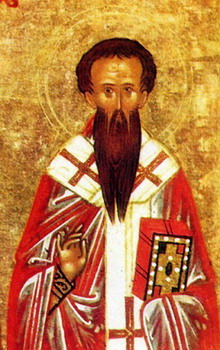 In a time of iconoclasm, this virtuous man was bishop in the city of Parius in Asia Minor. He refused to sign the imperial order against the veneration of icons, for which he was greatly persecuted and tortured. But he remained firm as diamond in his Orthodoxy. He died in the first half of the 8th century, and went to the Lord. In a time of iconoclasm, this virtuous man was bishop in the city of Parius in Asia Minor. He refused to sign the imperial order against the veneration of icons, for which he was greatly persecuted and tortured. But he remained firm as diamond in his Orthodoxy. He died in the first half of the 8th century, and went to the Lord.Our Holy Father Acacius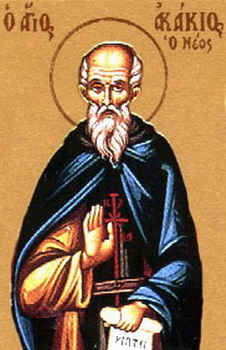 From the village of Goilitsa in Epirus, he was a great Athonite ascetic, spiritual guide and seer, and had many heavenly visions. He gave his blessing to several monks to seek martyrdom. He entered into rest at the age of 98, in 1730. From the village of Goilitsa in Epirus, he was a great Athonite ascetic, spiritual guide and seer, and had many heavenly visions. He gave his blessing to several monks to seek martyrdom. He entered into rest at the age of 98, in 1730.Our Holy Mother Athanasia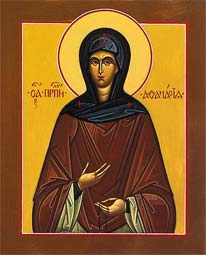 Born on the island of Aegina of rich and eminent parents, she gave her goods to the poor and went off to a monastery, where she heaped greater and greater asceticism on herself. She took food only once a day, and that only bread and water, and in the Great Fast only once every two days. Only at Christmas and Easter did she taste flesh and oil. Although she was abbess of the monastery, she was the servant of all the other sisters and was ashamed that any should wait on her. She was made worthy of the great gift of wonderworking, both during her lifetime and after her death. She entered into rest in the Lord in 860. Born on the island of Aegina of rich and eminent parents, she gave her goods to the poor and went off to a monastery, where she heaped greater and greater asceticism on herself. She took food only once a day, and that only bread and water, and in the Great Fast only once every two days. Only at Christmas and Easter did she taste flesh and oil. Although she was abbess of the monastery, she was the servant of all the other sisters and was ashamed that any should wait on her. She was made worthy of the great gift of wonderworking, both during her lifetime and after her death. She entered into rest in the Lord in 860.Virgin Anthusa of Constantinople (801)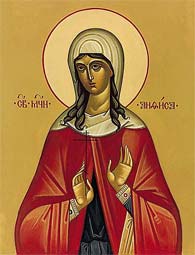 The Nun Anthusa was daughter of the Iconoclast emperor Constantine Copronymos (741-775) from his first wife from among the Khazars. She and her brother, the future emperor Leo the Khazar (775-780), were twins born on 25 January 750. The empress suffered very much with their birth. Constantine Copronymos summoned from prison the Hegumeness Anthusa (Comm. 27 July) and besought her prayers. The Nun Anthusa foretold the birth of twins and their fate. The daughter, born with the prediction of the Nun Anthusa, was named in her honour... The Nun Anthusa was daughter of the Iconoclast emperor Constantine Copronymos (741-775) from his first wife from among the Khazars. She and her brother, the future emperor Leo the Khazar (775-780), were twins born on 25 January 750. The empress suffered very much with their birth. Constantine Copronymos summoned from prison the Hegumeness Anthusa (Comm. 27 July) and besought her prayers. The Nun Anthusa foretold the birth of twins and their fate. The daughter, born with the prediction of the Nun Anthusa, was named in her honour...Martyrs Menas, David, and John of Palestine (630)The MonkMartyrs Minas, David and John asceticised in Palestine. They received a martyr's death in the VII Century from the Arabs, who shot them through with arrows (+ post 636, when Jerusalem was captured by the Arabs).
Hieromartyr Zeno, bishop of Verona (ca. 260)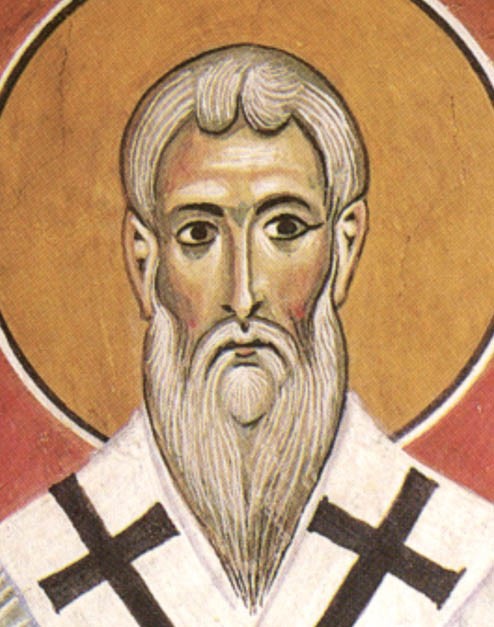 The PriestMonk Zenon, Bishop of Verona, was born a Greek and came from Syria. In his early years he accepted monasticism and toiled over the study of Holy Scripture. Wandering through the monasteries, the saint came to the city of Verona and settled there. The people chose him bishop of the city.
The emperors who then ruled, Constantius (353-361) and Valens (364-378), were advocates of the Arian heresy, which had been condemned at the First OEcumenical Council at Nicea in the year 325... The PriestMonk Zenon, Bishop of Verona, was born a Greek and came from Syria. In his early years he accepted monasticism and toiled over the study of Holy Scripture. Wandering through the monasteries, the saint came to the city of Verona and settled there. The people chose him bishop of the city.
The emperors who then ruled, Constantius (353-361) and Valens (364-378), were advocates of the Arian heresy, which had been condemned at the First OEcumenical Council at Nicea in the year 325...Martyrs Demas, Protion, and those with them
St. Basil, bishop of Ryazan (1295)
|